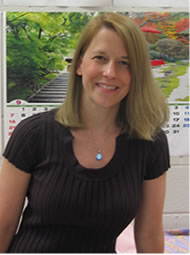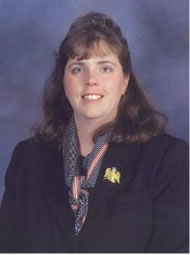2008 Award Recipients
Ms. Jessica Haxhi
Japanese Language Category
Teacher of grades 3-5 and Pre-kindergarten at Maloney Interdistrict Magnet School
Waterbury, Connecticut

Ms. Jessica Haxhi currently teaches grades 3-5 and Pre-kindergarten classes at Maloney Interdistrict Magnet School in Waterbury, Connecticut. In the summers, she teaches a K-8 world languages methodology course for Southern Connecticut State University and the Connecticut Department of Education.
Jessica first went to Japan to learn Japanese in 1988, as a junior at Duke University. She attended Kansai Gaidai University in Osaka for a semester abroad program. She was lucky to have made some Japanese friends while still in the U.S. through her childhood hobby – flying radio-controlled model airplanes. On weekends, these friends and many others helped her to travel to model airplane events all over central Japan and to practice her Japanese.
After graduating from college in 1990, Jessica returned to Japan on the JET Program to teach in Osaka for one year. After returning home, she found a job in an ESL program for Japanese college students and eventually as a part-time teacher of Japanese at the high school level.
When Jessica applied for a position as an elementary school teacher of Japanese in 1994, she wasn’t really sure that she could teach Japanese to young children. Their enthusiasm and ability was overwhelming and she fell in love with the age level. The Japanese Language and Culture Program is now in its 14th year and serves all 550 children in the school. Jessica’s close friend and colleague, Kazumi Yamashita (a former JALEX assistant), teaches grades K-2 and their constant collaboration has been a key to the success and longevity of the program.
Jessica especially enjoys discussing advocacy for Japanese programs and early language learning in general. Some of the advocacy initiatives she enjoys are a yearly pen pal program with an elementary school in Osaka, a twice-yearly “Lunch with the Sensei’s” with parents at a local Japanese restaurant, the sending of “interactive homework” for children to show parents what they have learned, maintaining an extensive website, a video-based project with each grade level that parents can view at home, and trying to keep lessons meaningful and fun for all students.
Jessica is the past president of the National Council of Japanese Language Teachers and she worked on the writing committees for the national Japanese standards and the Connecticut World Languages Framework. She has been a demonstration teacher for world language methods’ institutes at Concordia College and the National Foreign Language Resource Center at Iowa State University. Jessica was the Milken Family Foundation National Educator Award winner for Connecticut in 2002. She is currently serving on the Board of the Directors of the Northeast Conference on the Teaching of Foreign Languages.
Jessica plans to use the grant award to purchase Ipods for her classroom. She has recently begun to use small-group instruction in her upper-grade classes. Students in small groups are given meaningful, language-rich tasks to complete during the class while she works with one group doing conversation practice. Ipods will allow some of the small groups to be engaged in listening, viewing, and voice-recording tasks with a tool that students find very exciting!
Ms. Michelle L. Pearson
Humanities Category
Humanities Teacher
Hulstrom Options School – Northglenn, Colorado

Ms. Michelle Pearson is a social studies educator at Hulstrom Options School in Northglenn, Colorado. She teaches World Geography, World History, and American History, along with several extension courses which focus on the study of Japan, Asia, and Asian-American communities. She has taught a variety of subjects, and is the faculty sponsor of the National Junior Honor Society, the Podcasting Club, and several student enrichment activities. She serves on the Adams12 District Standing Committee for Social Studies, and works with several state-wide agencies and programs to promote the study of social studies and historic preservation at the k-12 level.
Ms. Pearson has held a long interest in Japan. She remembers growing up in the central valley of California along with many Japanese American friends, and several of her neighborhood friends were both Japanese, and first and second generation Japanese Americans. She was lucky enough to participate in many cultural activities surrounding their heritage as well as listening to stories from her grandfather who served in the military during WWII. Her undergraduate degree is from Mary Washington College in Fredericksburg, Virginia and was focused on the study of history with an emphasis on Japanese history and East Asia. She worked as a volunteer at the Smithsonian Institution in the National Air and Space Museum for three years cataloging photographs of Japanese and American aircraft during World War II, and helped design materials to support educational programming on Japanese Americans.
Upon her move to Colorado, she continued teaching at the K-8 level and received a Fulbright Memorial Fund Teacher Fellowship which allowed her to visit and study Japan. She was a participant in the Japanese Studies Leadership Program sponsored by the Program for Teaching East Asia, the Five College Center for East Asian Studies, and the East Asia Resource Center at the University of Washington as well as the Freeman Foundation. This program had a profound impact on her, and supported her work in professional development for other educators.
Ms. Pearson has since worked to promote the study of Japan through leading workshops for educators on Japan on the local, state, and national level, being a seminar leader for the National Consortium for Teaching Asia, working to preserve and document oral history from Japanese Americans in Colorado, supporting the development of new curricular materials for teachers on Japan through participation in a variety of focus groups and programs, and the review and field-testing of exemplary resources from the SPICE Program, the Program for Teaching East Asia, the Japanese American Museum, NEH, and local districts in Colorado.
Ms. Pearson feels that the most important element in the study of social studies is to engage students in hands-on activities that allow them to experience another culture. Because of this belief, she coordinates Japan Day for three inner-city schools in Colorado and her own, and has helped to establish an active Asian studies program extension at her school. She works with her students to stay in contact with three partner schools in Japan through the Fort Wright-Mukogawa Friendship Doll Program and a local sister-city program, and works with the Colorado Preserve America Youth Summit to encourage and support students in the preservation of historic sites and documenting the history of Japanese Americans in Colorado. She is deeply grateful to the outstanding mentors she has worked with who have helped shape how she teaches about Japan. With their guidance, leadership, and programming expertise, she is able to bring the study of Japan to the classroom and make a hopefully make a true difference at how students view, study, and communicate with Japan.


